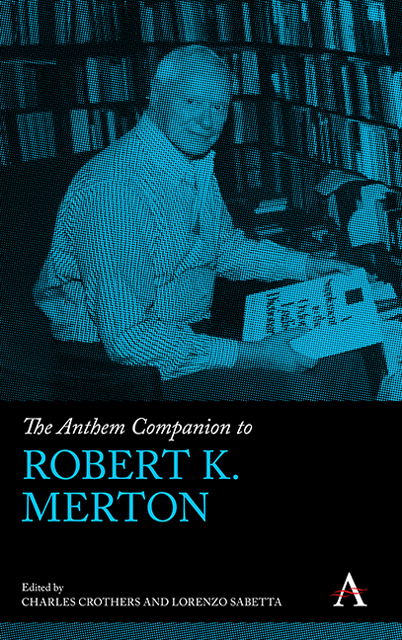Book contents
- Frontmatter
- Dedication
- Contents
- List of Figures and Tables
- Chapter One Introduction: Merton’s Self-Exemplifying Classical Sociological Contributions
- Chapter Two Skeptical Faith, Left Politics, and the Making of Young Robert K. Merton
- Chapter Three Theorist’s Progress: Young Robert K. Merton, 1941–1949
- Chapter Four Taking a Seminar with Merton
- Chapter Five The Development of Mertonian Status-and-Role Theory
- Chapter Six Theory as an Option or Theory as a Must? The Bearing of Methodological Choices on the Role of Sociological Theory
- Chapter Seven “Interviews of a Special Type”: Robert K. Merton and Codification of the Focused Interview
- Chapter Eight Science as a Culture
- Chapter Nine “Providing Puzzles”: Science as Norms and Values
- Chapter Ten A Mertonian Breviary for Cultural Sociologists
- Chapter Eleven The Unpublished Robert K Merton
- Author Biographies
- Index
Chapter Six - Theory as an Option or Theory as a Must? The Bearing of Methodological Choices on the Role of Sociological Theory
Published online by Cambridge University Press: 10 January 2023
- Frontmatter
- Dedication
- Contents
- List of Figures and Tables
- Chapter One Introduction: Merton’s Self-Exemplifying Classical Sociological Contributions
- Chapter Two Skeptical Faith, Left Politics, and the Making of Young Robert K. Merton
- Chapter Three Theorist’s Progress: Young Robert K. Merton, 1941–1949
- Chapter Four Taking a Seminar with Merton
- Chapter Five The Development of Mertonian Status-and-Role Theory
- Chapter Six Theory as an Option or Theory as a Must? The Bearing of Methodological Choices on the Role of Sociological Theory
- Chapter Seven “Interviews of a Special Type”: Robert K. Merton and Codification of the Focused Interview
- Chapter Eight Science as a Culture
- Chapter Nine “Providing Puzzles”: Science as Norms and Values
- Chapter Ten A Mertonian Breviary for Cultural Sociologists
- Chapter Eleven The Unpublished Robert K Merton
- Author Biographies
- Index
Summary
Still Struggling to Get Along? The Difficult Interplay of Social Theory and Social Research
Aims-and-scope sections of most social science academic journals or peer-reviewed book series come with a familiar caveat: the editors especially welcome theoretically oriented empirical research, empirically grounded theoretical framework, or, less pompously stated, submissions combining theory and research. In the same spirit, such a combination is usually underscored when major scientific accomplishments are hailed, often commended for having conveyed both evidential and epistemic insights. Though not without exceptions, the same praise applies to classical authors (whose work made the best of both worlds more often than not) and becomes a warning when directed to graduate students (whose work should at least try to keep data and speculations together). Indirectly, however, the stress on intertwining theory and research in social science indicates the likelihood of the opposite possibility, its lack thereof; otherwise, why value and recommend the standard scenario or average outcome? Further proof that a solid link between theory (and its abstractions) and analysis (and its procedures) is not the default in sociology comes from the myriad of scholarly works devoted to making the case for the said link; again, there would be no point in pleading so forcefully an already-won cause. It rather seems, actually, that a remarkable feature of successfully bringing theory into contact with evidence, and vice versa, is one common to all the things which are formally advised, taught, prized, not naturally occurring – the fact of being difficult to obtain.
One of the earlier and most thorough efforts to bridge the gap and strengthen this desirable yet somehow weak link was made by Robert K. Merton in his Social Theory and Social Structure (henceforth, STSS): the interplay of social theory and social research, admittedly, pervades ‘the whole of the book’ (Merton 1968, vi), preluded by the exposition of middle-range theories and then unfolded through two mirror-image chapters, ‘The Bearing of Sociological Theory on Empirical Research’ and ‘The Bearing of Empirical Research on Sociological Theory’. Indeed, though progressively obliterated by incorporation and viewed as a common heritage of sociology, this topos remains quintessentially Mertonian, and every edited volume dedicated to Merton has its own theory-and-research-relationship chapter (Kendall 1975; Blalock 1990; Gould 1990; Ammassari 1998; Sampson 2010). This Companion makes no exception.
- Type
- Chapter
- Information
- The Anthem Companion to Robert K. Merton , pp. 107 - 132Publisher: Anthem PressPrint publication year: 2022

